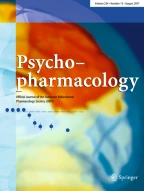Abstract
Rationale
Acute administration of antidepressants which potentiate serotonin (5-HT) and noradrenaline (NA) function stimulates the hypothalamic-pituitary-adrenal (HPA) axis and increases salivary free cortisol in healthy subjects. The effects of repeated antidepressant administration have been less studied, but the ability of such treatment to modulate HPA axis activity may be relevant to therapeutic effects.
Objective
The objective of the study was to assess the effect of short-term treatment with two different antidepressant medications on HPA axis activity.
Methods
We studied the effect of 6-day treatment with the selective serotonin re-uptake inhibitor (SSRI) citalopram (20 mg daily) and the selective noradrenaline re-uptake inhibitor, reboxetine (8 mg daily), on diurnal salivary cortisol in a parallel group, placebo-controlled, double-blind design.
Results
Citalopram significantly enhanced the increase in salivary cortisol produced by waking, while the effect of reboxetine treatment was indistinguishable from placebo. There was no change in basal salivary cortisol levels sampled in a standard pattern throughout the day.
Conclusions
Short-term treatment with citalopram and reboxetine produced strikingly different effects on waking salivary cortisol, arguing against a common effect of antidepressant drugs on HPA axis function. Waking salivary cortisol may be a more reliable means of assessing the effects of antidepressant treatment on the HPA axis than a standard regime of basal salivary sampling.

Similar content being viewed by others
References
Anderson IM, Deakin JFW, Miller HEJ (1996) The effects of chronic fluvoxamine on hormonal and psychological responses to buspirone in normal volunteers. Psychopharmacology 128:74–82
Bhagwagar Z, Hafizi S, Cowen PJ (2002) Acute citalopram administration produces correlated increases in plasma and salivary cortisol. Psychopharmacology 163:118–120
Hennig J, Lange N, Haag A, Rohrmann S, Netter P (2000) Reboxetine in a neuroendocrine challenge paradigm: evidence for high cortisol responses in healthy volunteers scoring high on subclinical depression. Int J Neuropsychopharmacol 3:193–201
Hill SA, Taylor MJ, Harmer CJ, Cowen PJ (2003) Acute reboxetine administration increases plasma and salivary cortisol. J Psychopharmacol (in press)
Inder WJ, Prickett TC, Mulder RT, Donald RA, Joyce PR (2001) Reduction in basal afternoon plasma ACTH during early treatment of depression with fluoxetine. Psychopharmacology 156:73–78
Kirschbaum C, Kudielka BM, Gaab J, Schommer NC, Hellhammer DH (1999) Impact of gender, menstrual cycle phase, and oral contraceptives on the activity of the hypothalamus-pituitary-adrenal axis. Psychosom Med 61:154–162
Knutson B, Wolkowitz OM, Cole SW, Moore EA, Johnson RC, Terpstra J, Turner RA, Reus VI (1998) Selective alteration of personality and social behaviour by serotonergic intervention. Am J Psychiatry 155:373–379
Laakmann G, Hinz A, Voderholzer U, Daffner C, Muller OA, Neuhauser H, Neulinger E, Wittmann M (1990) The influence of psychotropic drugs and releasing hormones on anterior pituitary hormone secretion in healthy subjects and depressed patients. Pharmacopsychiatry 23:18–26
López JF, Chalmers DT, Little KY, Watson SJ (1998) Regulation of serotonin1A, glucocorticoid, and mineralocorticoid receptor in rat and human hippocampus: implications for the neurobiology of depression. Biol Psychiatry 43:547–573
O'Keane V, McLoughlin D, Dinan TG (1992) d-Fenfluramine-induced prolactin and cortisol release in major depression: response to treatment. J Affect Disord 26:143–150
Pariante CM, Miller AH (2001) Glucocorticoid receptors in major depression: relevance to pathophysiology and treatment. Biol Psychiatry 49:391–404
Pruessner JC, Wolf OT, Hellhammer DH, Buske-Kirschbaum AB, Von Auer K, Jobst S, Kaspers F, Kirschbaum C (1997) Free cortisol levels after awakening: a reliable biological marker for the assessment of adrenocortical activity. Life Sci 61:2539–2549
Ribeiro SCM, Tandon R, Grunhaus L, Greden JF (1993) The DST as a predictor of outcome in depression: a meta-analysis. Am J Psychiatry 150:1618–1629
Sagud M, Pivac N, Muck-Seler D, Jakovljevic M, Mihaljevic-Peles A, Korsic M (2002) Effects of sertraline treatment on plasma cortisol, prolactin and thyroid hormones in female depressed patients. Neuropsychobiology 45:139–143
Sargent P, Williamson DJ, Pearson G, Odontiadis J, Cowen PJ (1997) Effect of paroxetine and nefazodone on 5-HT1A receptor sensitivity. Psychopharmacology 132:296–302
Schmidt-Reinwald A, Pruessner JC, Hellhammer DH, Federenko I, Rohleder N, Schurmeyer TH, Kirschbaum C (1999) The cortisol response to awakening in relation to different challenge tests and a 12-hour cortisol rhythm. Life Sci 64:1653–1660
Späth-Schwalbe E, Scholler T, Kern W, Fehm HL, Born J (1992) Nocturnal adrenocorticotropin and cortisol secretion depends on sleep duration and decreases in association with spontaneous awakening in the morning. J Clin Endocrinol Metab 75:1431–1435
Stahl SM, Nierenberg AA, Gorman JM (2001) Evidence of early onset of antidepressant effect in randomised controlled trials. J Clin Psychiatry 62:17–23
Versiani M, Amin M, Chouinard G (2000) Double-blind, placebo-controlled study with reboxetine in inpatients with severe major depression. J Clin Psychopharmacol 20:28–34
Wüst S, Federenko I, Hellhammer DH, Kirschbaum C (2000) Genetic factors, perceived chronic stress, and the free cortisol response to wakening. Psychoneuroendocrinology 25:707–720
Acknowledgements
The authors thank R. Hockney for nursing care and Alison Reed for technical assistance. The study was supported by the Medical Research Council.
Author information
Authors and Affiliations
Corresponding author
Rights and permissions
About this article
Cite this article
Harmer, C.J., Bhagwagar, Z., Shelley, N. et al. Contrasting effects of citalopram and reboxetine on waking salivary cortisol. Psychopharmacology 167, 112–114 (2003). https://doi.org/10.1007/s00213-003-1417-y
Received:
Accepted:
Published:
Issue Date:
DOI: https://doi.org/10.1007/s00213-003-1417-y



